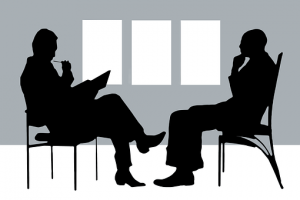A common view of communication is that it is a process of exchange. We listen. We talk. The arrows flow in two directions. Conversations become sustaining in ways that disembodied messages can’t match.

With notable exceptions, the dialogical model of communication is in decline. The persistence of effort required in sustained conversations is in short supply. We find it harder to maintain the attention needed to hear what another is saying, struggling to engage brains that have been rewired to accommodate the pace of the digital drumbeat. To get my car serviced, I now explain a problem while the service agent enters data on a screen with its own fill-in-the-blanks rubric. Many patients describe the same experience when they see a doctor. And even that minimal level of connection is lost as digital robots take over the customer service functions of more businesses.
Communal spaces designed to encourage easy exchanges between individuals now function as ersatz phone booths. The phones come out as individuals sharing a public space drift into their own informational worlds. Devices of all sorts have become forms of protection against expending energy in direct engagement.
Even if fewer real bodies ever make it to our front door, our digital threshold is traversed all the time. And so what is obvious is also consequential: the din of intruding messages are seen as welcome opportunities to avoid the eyes of another who might expect a response.
Why does the retreat from direct conversation matter? Innovations can enhance or disrupt our species’ innate inclination to seek relationships with others. Some can serve as extensions of our natural tendencies for sociality: tendencies that show up in birthright impulses such as empathy and other-awareness. But personal media often do the reverse as well, pulling us further away from the lives and experiences of others. Smartphones make it easy to mistake the disembodied fragment of another person for the real thing.

Another sign of the decline of the dialogical model is how quickly we now fatigue of the effort required to sustain attention on another. Communication has always had a performative function that makes us duty-bound to at least fake interest. But for many, face time with another hardly seems worth even that minimal effort. Richard Linklater and others may write movie scenes featuring direct and revealing conversations. That’s the method of his remarkable trilogy about a couple that concludes the film Before Midnight (2013). But the rich conversational palette of his films stands in stark contrast to a world of Americans with eyes shuttered to the sensate world in favor of the small screen.
The favored pattern now is better represented with self-obsessed figures defined more by their strong interjections than their willingness to be a witness to others in the flesh. The preemptive rhetorical strikes of the President or a stand-up comic seem to reflect the times. We now have many more models of figures who need to exercise their expressive urges as short judgmental rants. The President’s preferred medium of Twitter come across as shouts issued from a person unaccustomed to listening. They are the functional equivalent of the honk of an annoyed driver, a middle finger raised in a gesture of defiance, or a rant unleashed as a digital “comment.” Each is the same one-way form of communication-as-declamation.
All of this means that our expressive muscles get a workout, much more so than those tuned to the rhythms of another in an authentic conversation. To get conversational muscles back in shape and functioning again, consider a few modest suggestions:
- Never give preference to a device over another person in the same space.
- Ask yourself if your ‘screen gaze’ is becoming your public face.
- See if you can find the time to hear another person out.
- Save the tough stuff for a face to face conversation, but…
- Find time to also talk about the fun stuff.
